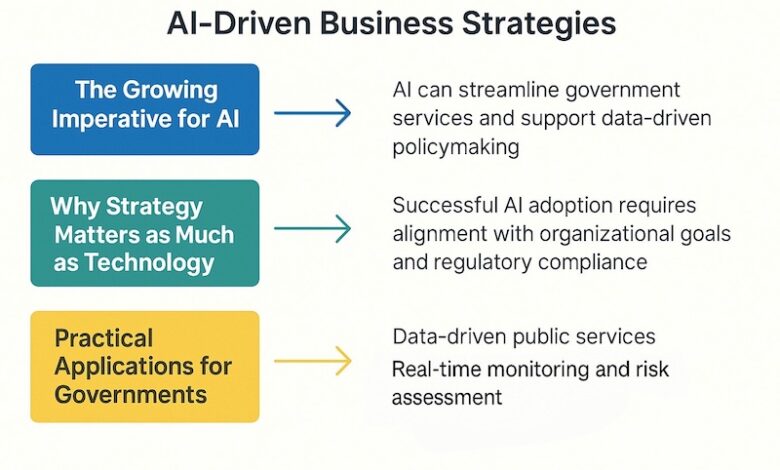
Artificial Intelligence is no longer a futuristic concept reserved for tech giants. From government
agencies seeking more efficient public services to mid-market enterprises aiming for competitive
edge, AI is quickly becoming a key pillar in business strategy. Yet despite growing awareness,
many organizations grapple with questions: How do we integrate AI effectively? How do we
manage risk and compliance? And how can we ensure AI initiatives truly align with our mission?
The answers, as it turns out, often lie at the intersection of practical advisory expertise and deep
technological innovation. One illustrative example is the collaboration between Anchora
Advisory Group—a global business consulting firm—and AI innovator Bofin. Drawing on
complementary strengths, they provide a glimpse into how governments and mid-market
businesses worldwide are navigating the AI revolution with agility and confidence.
The Growing Imperative for AI
In the public sector, AI has the potential to streamline government services, support data-driven
policymaking, and enhance national security. Many agencies still struggle with legacy systems,
data silos, and complex compliance frameworks. AI-powered solutions can tackle these
challenges by automating time-consuming tasks, improving inter-departmental coordination, and
enabling real-time analytics.
Meanwhile, mid-market companies increasingly see AI as a catalyst for global expansion and
operational efficiency. AI can forecast market trends, optimize supply chains, detect fraud, or
offer personalized customer interactions. The mid-market sector, however, often lacks the
extensive research and development budgets of larger corporations and is wary of adopting
new technologies without clear, measurable returns.
Why Strategy Matters as Much as Technology
Regardless of size or sector, successful AI adoption requires more than just good software. It
demands alignment with organizational goals, regulatory compliance, and a clear roadmap for
implementation. This is where a multidisciplinary approach becomes invaluable.
Anchora Advisory Group, headed by CEO Joe C. Lopez, has built its reputation on helping
organizations expand into new markets and navigate complex regulatory environments. They
focus on global governance, scenario planning, and risk management—areas where AI can
either provide significant benefits or introduce new pitfalls if not deployed ethically and
responsibly. By anchoring AI initiatives in sound business strategy and compliance structures,Anchora ensures technology serves the broader mission, rather than existing in a silo as a flashy gadget.
The Role of Bofin’s AI Expertise
On the technology front, AI pioneer Bofin has deep experience in cybersecurity and threat
intelligence. Known for applying advanced neural networks to cybersecurity challenges, Bofin
has a proven track record in building enterprise-grade AI products. Today, his focus spans
across large language models (LLMs), brand monitoring, and data-driven analytics for risk
Prevention.
By bringing Bofin into the conversation, Anchora gains direct access to cutting-edge AI insights
and practical engineering know-how. This expertise helps governments and mid-market firms
overcome real-world barriers—like integrating AI with legacy systems, securing data in heavily
regulated industries, and ensuring that AI tools actually support everyday decision-making. The
result is an approach that unites strategic advisory with robust AI capabilities.
Practical Applications for Governments
- Data-Driven Public Services
Government agencies often handle massive data sets, from population demographics to
infrastructure usage. By applying AI for data analysis, officials can quickly identify
inefficiencies, forecast resource requirements, and develop targeted initiatives.
Anchora’s governance background helps create frameworks for accountability and
oversight, while Bofin’s AI know-how ensures that the data pipelines and analytical
models remain accurate, secure, and ethically sound.
- Real-Time Monitoring and Risk Assessment
Governments face constant threats—cyberattacks, misinformation campaigns, or
intellectual property theft. AI models developed under Bofin’s guidance detect patterns
and anomalies that might go unnoticed by human analysts. Combined with Anchora’s
expertise in scenario planning, agencies can respond to emerging risks promptly, with a
clear sense of both the technological and diplomatic implications.
- Compliance Across Jurisdictions
International governance is complicated, and the stakes are high when data crosses
borders. Anchora’s consultants, well-versed in foreign affairs and regulatory nuances,
collaborate with Bofin to ensure AI-driven projects align with local data protection laws
and government directives. This fusion of advisory and tech helps agencies maintain
public trust and stay ahead of evolving legislation.
Enabling Mid-Market Businesses
- Market Expansion and Growth
Many mid-market firms aim to enter new markets but lack clarity on local consumer
behavior or cultural intricacies. AI-driven analytics can surface hidden trends, predict
consumer responses, and tailor marketing campaigns to regional nuances. Anchora’s
broader market-entry strategies and compliance frameworks reduce the risk of costly
missteps, while Bofin’s AI solutions keep the insights relevant and timely.
- Operational Efficiency
AI can automate repetitive processes, from financial reconciliation to quality checks on
production lines. Anchora identifies where automation offers the greatest return on
investment, while Bofin ensures the underlying algorithms can handle different types of
data, adapt to changing conditions, and produce tangible cost savings or productivity
gains.
- Brand and Reputation Management
In a digital-first world, brand perception can shift in an instant. AI technologies can track
online conversations, flag potential reputational issues, and even predict where brand
sentiment may be heading. Anchora’s expertise in governance and corporate affairs
gives companies the strategic blueprint to respond or pivot, while Bofin’s AI solutions
provide the real-time intelligence needed to act quickly and effectively.
Balancing Innovation with Responsibility
While AI brings transformative possibilities, it also raises legitimate concerns around data
privacy, bias, and accountability. Careful planning and ethical guardrails are
essential—particularly for governments and regulated industries. Both Anchora and Bofin
emphasize responsible AI use, ensuring that projects comply with relevant laws and prioritize
fairness and transparency.
Mid-market organizations also benefit from a balanced approach. By incorporating compliance
and governance principles from the outset, they can avoid pitfalls such as unintentional bias in
automated decision-making. The ultimate goal is to harness AI’s power for sustainable, inclusive
growth that respects both local regulations and human values.
The Future of AI Adoption
As more governments and mid-market companies explore AI solutions, success will hinge on
forging strategic partnerships that bridge high-level advisory with cutting-edge technology. This
includes interdisciplinary teams who understand both the big-picture objectives and the granular
details of AI deployment.
The collaboration between Anchora Advisory Group and Bofin serves as a roadmap for how
different expertise areas can seamlessly integrate. By focusing on ethical implementation,
robust cybersecurity, and tangible business outcomes, they exemplify how organizations—be
they public institutions or privately held companies—can adapt to the AI revolution responsibly
and effectively.
In a fast-evolving digital landscape, it pays to keep a close eye on how AI’s potential continues
to unfold. Governments seeking more efficient public services and mid-market businesses
striving for competitive advantage share a common challenge: turning the promise of AI into
reality. Through strategic planning and proven technological capabilities, the path to meaningful
AI adoption becomes not just feasible, but a cornerstone of future success.




